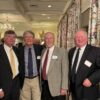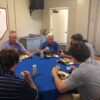The Beginning
As the Christmas holidays approached in 1848, the atmosphere on the Miami campus in Oxford, Ohio was gloomy and uncertain. This was the mood in which Robert Morrison suggested to a close friend and classmate, John McMillan Wilson, that they consider putting together a new collegiate brotherhood.
From this elemental beginning, Phi Delta Theta evolved into the positive international force for good it has become over the past 164 years.
“The Immortal Six” – Founding Fathers
Morrison and Wilson, thinking in terms of providing a permanent base with growth potential, sought out underclassman they visualized as joining them. Thus juniors John Wolfe Lindley and Robert Thompson Drake were approached, as were sophomores Ardivan Walker Rodgers and Andrew Watts Rogers, all of who accepted the concept.
All six men were among the depleted ranks of Miami students who did not attempt to go home to join their families for the Christmas holidays because of the difficult travel conditions and bitter winter weather.
The need for close companionship had to be evident when the six met the night of December 26, 1848 in Wilson’s second floor room in Old North Hall, directly above Morrison’s room. They firmed up their desire to establish a brotherhood.
They met two nights later in the same room to consider an appropriate motto and constitution. Morrison and Wilson put the consensus ideas into terminology that became The Bond that every initiate has signed to become a member of the Fraternity.
On December 30, the “Immortal Six” put their signatures to The Bond of the Phi Delta Theta in Wilson’s room in Elliott Hall. Their names remain a vital part of the rituals that continue today in every chapter room across the United States and Canada. The Bond has remained unchanged from that day to this. So far as it is known, it is the only document of any fraternity of such a character, and it is easy to understand the veneration with which all Phis regard it.
The first branch of Phi Delta Theta was established at Indiana University in October of 1849 and other chapters followed at Centre College and Wabash College. The real growth occurred during the two decades from 1870 to 1890 due principally to the efforts of Walter B. Palmer, Emory-Vanderbilt 1877, and George Banta, Franklin-Indiana 1876. The two were given the title Second Founders for their work.
An International Fraternity
In 1900, twelve students at McGill University submitted a charter application. The request was presented at the General Convention in November where it was decided to grant the charter. At the installation of Quebec Alpha on April 5, 1902, a toast to the King was followed by a toast to the President and Phi Delta Theta was hence forth known as an international fraternity. The Fraternity continued to extend its presence in Canada, eventually stretching from coast to coast.
The Leader in the Fraternity World
Phi Delta Theta was the first Fraternity to create an endowment for free lifetime subscriptions to the Fraternity magazine called The Scroll, a plan later adopted by nearly every other fraternal organization. Phi Delta Theta was also the first to adopt a pledge button and the first to publish a pledge manual.
Phi Delta Theta members have occupied every major public office including the presidency and vice presidency of the United States, Speaker of the U.S. House of Representatives, U.S. Senators and Congressmen, State Governors and Senators in the Canadian House of Commons. Phi Delta Theta also holds the unique distinction of having Brother Neil Armstrong as the first man on the moon.
The Fraternity continued to grow and expand surviving tough times such as war, the Great Depression, and the civil rights movement. The 1980s changed the way Fraternities conducted business with new legal charges in suits involving alcohol abuse, hazing, and discrimination. Fraternity insurance and risk management programs were born and new educational program initiatives were directed at combating these issues to ensure the safety and well being of our members.
Phi Delta Theta reaffirmed its leadership role in the late 1990s when it voted to eliminate alcohol from chapter facilities by the year 2000. Based on this new movement, the Fraternity has undergone one of its largest growth spurts in the history of the modern Fraternity. This indicates a renewed demand for a values-based organization from college students. Phi Delta Theta continues to be a model for other Greek organizations looking to make the same positive move.
Phi Delta Theta now has nearly 160 active chapters in 43 states and five Canadian provinces. The Fraternity has initiated more than 228,000 men and currently has more than 142,000 living alumni. There are over 100 recognized alumni clubs across the U.S. and Canada. Georgia Alpha was formed on June 5, 1871.
The Fraternity operates from the General Headquarters building on South Campus Avenue, across from Miami University in Oxford, Ohio. At the corner of the campus closest to headquarters, memorial gates were erected in honor of the Fraternity’s 125th anniversary.
At the University of Georgia
On June 5, 1871 the Georgia Alpha Chapter of Phi Delta Theta was founded at the University of Georgia. With 137 years on this campus we are the longest continuously active fraternity at UGA. We pride ourselves on our strong, close-knit brotherhood and the caliber of our chapter. Since 1871, Georgia Alpha has consistently produced some of Georgia’s greatest governors, lawyers, and businessmen, including the late Governors Vandiver and Busbee, and Olympic Committee Chairman and Chairman of Augusta National Billy Payne. Several members of our chapter serve in the Armed forces, and we are proud to count a recipient of the Congressional Medal of Honor among our distinguished Alumni.
For over 140 years at the University of Georgia, Phis have been involved in all areas of campus life, including academics, athletics, and philanthropy. Of all our many accomplishments as a chapter, we are most proud of the strength of our diverse brotherhood and supportive Alumni helping our chapter continue to remain successful today.



